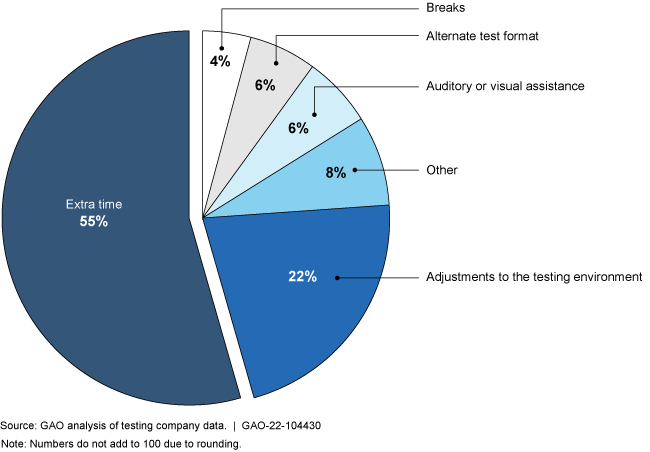Higher Education: Testing Companies Most Commonly Granted Extra Time to Accommodate Individuals with Disabilities
Fast Facts
Under the Americans with Disabilities Act, companies that administer standardized higher education tests—like the SAT or GRE—must grant accommodations to individuals with disabilities. The most common accommodations granted in 2019-2020 were extra time and testing environment adjustments, like preferential seating or a separate room.
But some individuals with disabilities had difficulty providing adequate documentation to justify their requests. And 5 of 6 testing companies we reviewed described issues with reviewing and granting accommodation requests, such as providing accommodations while protecting test integrity.
Accommodations that testing companies granted to individuals on certain standardized tests in 2019-2020

Highlights
What GAO Found
Companies that administer standardized higher education tests grant a variety of accommodations to help ensure their tests are accessible to individuals with disabilities. The most common accommodations granted in 2019-2020 were for individuals who needed extra time or adjustments to the testing environment, according to the most recent data from the six testing companies GAO reviewed (see figure). In determining eligibility for accommodations, officials from those testing companies reported considering factors such as how a disability affects an individual's ability to test under standard conditions and any prior use of accommodations. Officials also said they consider whether a request is appropriate for a particular test (e.g., whether granting it could affect test validity).
Most Common Accommodations Granted on the ACT, AP Exams, GMAT, GRE, LSAT, MCAT, PSAT, and SAT, 2019-2020

Note: Tests include the ACT, Advanced Placement (AP) Exams, Graduate Management Admission Test (GMAT), GRE General Test (GRE), Law School Admission Test (LSAT), Medical College Admission Test (MCAT), Preliminary SAT (PSAT) assessments for tenth and eleventh graders, and SAT. Numbers do not add to 100 due to rounding.
Individuals with disabilities and testing companies faced several challenges related to testing accommodations. For example, some individuals had difficulty providing adequate documentation to justify their accommodations, according to representatives from six disability advocacy organizations. Officials from five of the six testing companies described challenges in reviewing and granting accommodation requests. For example, officials from three testing companies said requests that do not sufficiently describe an individual's disability and its impact are difficult to evaluate. In addition, officials from two companies said it can be challenging to provide appropriate accommodation access while also protecting test integrity.
The Department of Justice enforces requirements under the Americans with Disabilities Act of 1990, as amended, (ADA) related to testing accommodations. Justice has investigated or referred reports of potential violations, intervened in private litigation, and clarified requirements to promote compliance. From 2017 through 2020, Justice reported receiving and closing more than 90,000 reports of potential ADA violations, of which fewer than 100 pertained to the selected tests in GAO's review. To manage resources, Justice officials said they prioritize reports that could have a broad impact for investigation or referral to U.S. Attorney's Offices. Justice officials also said the agency can intervene in private lawsuits to address systemic problems with testing accommodations. In 2015, Justice issued a technical assistance document to clarify ADA requirements for testing accommodations.
Why GAO Did This Study
Each year, millions of individuals take standardized tests—like the SAT or GRE—with the goal of pursuing higher education. Under the ADA, testing companies must provide accommodations to individuals with disabilities. Justice is responsible for enforcing ADA requirements related to testing accommodations.
GAO was asked to review accommodations on higher education tests. This report examines (1) the types of accommodations testing companies grant and how they make those decisions, (2) challenges associated with testing accommodations, and (3) how Justice has enforced compliance with ADA requirements related to testing accommodations.
GAO obtained and reviewed accommodation data from the six testing companies that administer the ACT, AP Exams, GMAT, GRE, LSAT, MCAT, PSAT, and SAT. These tests are commonly associated with admission into higher education programs. The data are from 2019 through 2020, the most recent available. GAO also reviewed relevant federal laws and regulations and Justice's data on closed reports and investigations of potential ADA violations pertaining to the selected tests from 2017 through 2020, the most recent data available. GAO interviewed officials from the six testing companies, six disability advocacy organizations selected to reflect a range of perspectives, and from Justice.
For more information, contact Melissa Emrey Arras at (617) 788-0534 or emreyarrasm@gao.gov.
